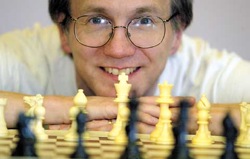I hate to interrupt the great discussion that we’re having about chess talent, but I have some news that I want to pass along.
A few months ago I posted a story here called Dixit Magister, which was about the queen sacrifice game that I played with IM David Pruess in 2006. My readers provided some excellent feedback, which enabled me to make some significant improvements to the story. For example, I junked nearly the whole first section, which several people thought would be likely to confuse non-chess players. I also got rid of the pretentious Latin title and gave it a more comprehensible title, “The Departed Queen.”
Then I submitted the story to a website called Story Collider, which publishes first-person stories about science and by scientists. You might think that it’s a little bit of a stretch to pitch “The Departed Queen” as a science story, but I figured out a way to pull it off, by emphasizing the artificial-intelligence theme. That is, how will we deal with artificial intelligence, and what is left for us when computers can perform some mental tasks better than we can? Most of that is in the revised first section; I did not change the rest of the story very much.
Well, the good news is that they accepted my story, and it went up today on the Story Collider website! I hope you’ll check out the new-and-improved version, which also has a new epilogue that the editor liked a lot.
Even though I don’t get paid a penny for this article, I’m more excited about it than most of the articles that I do get paid for. Probably I have a little bit of an inferiority complex about being a journalist rather than a creative writer, and so it’s nice to see that I can do the creative-writing thing too. But also, I’m excited to be able to write in a completely serious way about the beauty of chess, for a non-chessplaying audience.
All of you were an integral part of bringing this story out of its limbo, so congratulations to you too, and thanks!



{ 2 comments… read them below or add one }
Nice work! I agree that it’s a clear improvement over the first version, and the new emphasis on computers doesn’t feel artificial at all. I will definitely pass it on to non-chess-playing friends as a well-written and compelling example of the way we think (and act) about the game.
Great article, Dana. You might be interested in Mark Dvoretsky’s latest article at chesscafe.com, which discusses the use of computers to improve tactical skills. (I recently played a game where both players missed a “computer” defense. Of course, we missed some very human moves as well 🙂